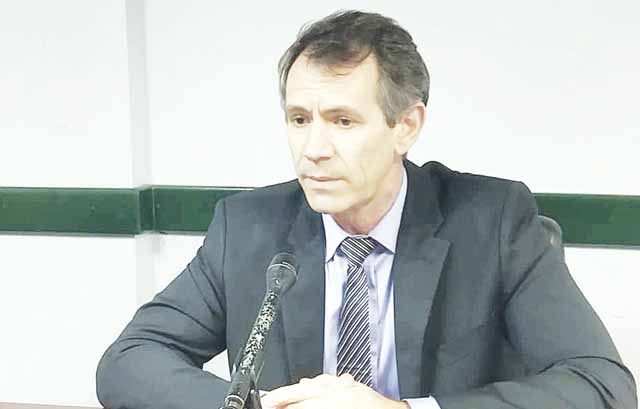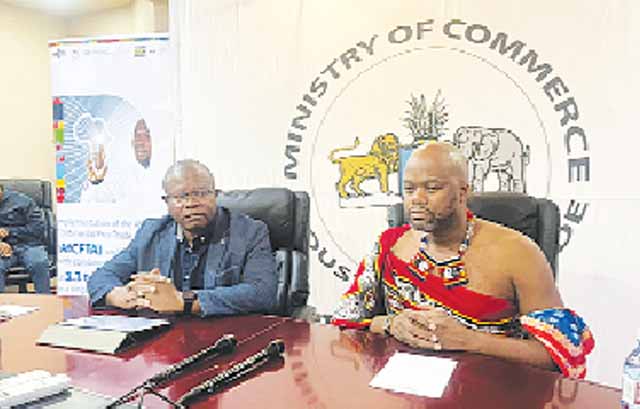By KWANELE DHLADHLA | 2023-12-03

Minister of Finance Neal Rijkenberg has stepped into action to resolve the health crisis which faces the kingdom by cleaning up invoices for procurements made outside of the normal ordering system.
Rijkenberg, who has been selected to be part of the Cabinet sub-committee announced by Prime Minister Russell Dlamini on Wednesday to actively deal with the medicine and drugs shortage which has culminated into a health crisis, has disclosed that the ministry of health had accumulated purchases outside of the budget process.
“We are currently working on solving that at the moment. The Cabinet sub-committee is also working to assist with health issues,” said Rijkenberg.
The minister mentioned that the planning and budgeting committee had looked into government procurement as a whole, to ensure that ministries spend within their budget as a result, spend within budget.
Rijkenberg went on to point out that the ministry of finance continues to prioritise ministry of health payments submitted to treasury. He stated that to date, everything that was due to health suppliers at the treasury department had been settled in full.
“What is outstanding to suppliers is still at the ministry of health being processed for payments,” Rijkenberg disclosed. The minister mentioned that they prioritise ministry of health payments on a weekly basis in order to pay all that was due.
“It is important for Emaswati to know that the ministry of finance and ministry of health are working in collaboration to sort out the health issues in the country and that there are no gaps between the two ministries.
We are working very closely,” Rijkenberg committed.
The PM directed the police to speed up investigations and effect arrests of all those involved in corrupt activity in the procurement of pharmaceuticals.
This applies to both service providers and government officials, who may have contributed to the series of alleged corrupt activities that led to the shortage of medicine and drugs, culminating into a health crisis.
The prime minister said government had taken drastic steps to resolve the prevailing health crisis triggered by the shortage of drugs in the government health system.
When probed as to whether the ministry of finance would be able to cater for the staff shortages within the health institutions across the country particularly in terms of salaries, Rijkenberg said; ‘as long as public service continues to work within the budget ceiling of the wage bill there will be no wage bills issues.’
In mitigating the crisis, the prime minister stated that a sub-committee led by Minister of Commerce, Industry and Trade, Manqoba Khumalo, whose members are the ministers of Finance (Neal Rijkenberg), Health (Mduduzi Matsebula) and Labour and Social Security (Phila Buthelezi) had already been constituted.
Government Spokesperson, Alpheous Nxumalo, mentioned that in addition, there would also be principal secretaries from the Prime Minister's Office, Bertram Stewart and Ministry of Health, Khanya Mabuza and other principal secretaries would interact with the sub-committee on a need to know basis.
The prime minister also committed that the team would meet daily to monitor and ensure that the turnaround plan was implemented and that the current crisis got resolved with immediate effect.
“His Majesty’s Government is confident that the urgent implementation of these interventions will bring relief to the current crisis and, therefore, implores the public for support in any way possible,” said Dlamini.
SWADNU Secretary General (SG) Mayibongwe Masangane, in a statement said they were greatly concerned with the perpetual shortage of medical supplies, drugs and personnel in health institutions. Masangane said the shortage had allegedly caused frustrations to the health care workers in general, more especially the nurses in particular.
He said the dire shortage of health care workers hindered with provision of quality public health delivery.
According to Masangane, the alleged dysfunctional of the health care system in the country weighed heavy on the poor majority who lived below the poverty line. “This majority cannot afford to cater for the health care needs as most of them are unemployed and live on hand-outs,” Masangane said.
share story
Post Your Comments Below

Eswatini's longstanding membership in the various regional integration arrangements has positione...

OVER 300 Emaswati that invested with Ecsponent Eswatini (Pty) Ltd yesterday heeded to Judge Khont...
SOCCER - CAPITAL city side Mbabane Swallows and ambitious Nsingizini Hotspurs will headline the 8...

SOUTH African multi-award-winning gospel ensemble, Worship House is building partnerships in Eswa...
All material © Swazi Observer. Material may not be published or reproduced in any form without prior written permission.
Design by Real Image Internet